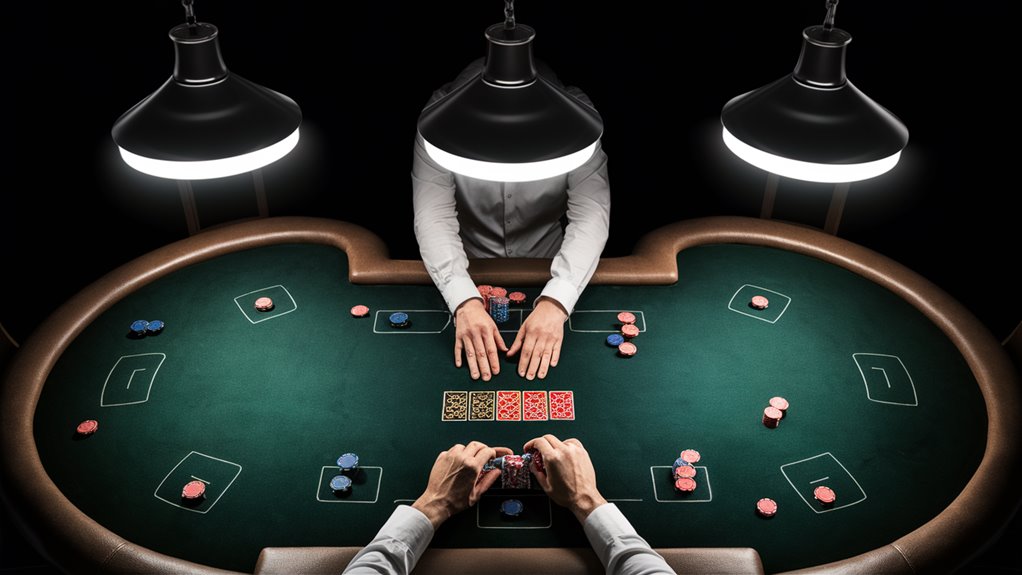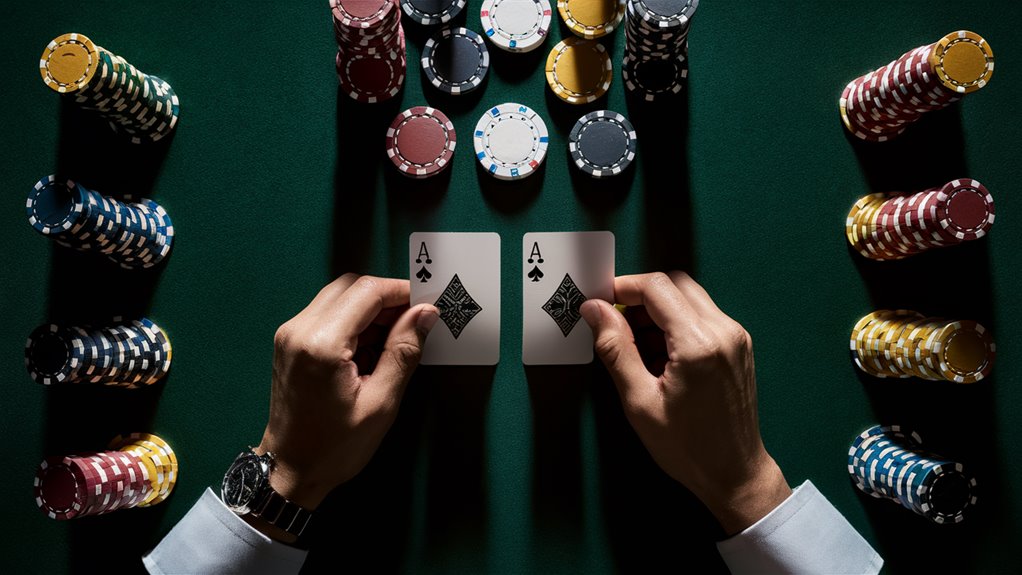
So, you're thinking about getting into poker? Well, let me tell you, there's a lot more to winning at the tables than just knowing when to hold 'em and fold 'em. Trust me, we've all been there, staring at our cards and wondering if we're making the right moves.
Look, becoming good at poker isn't rocket science, but it does take more than luck and memorizing the basic rules. Think of it like learning to drive, you know? Sure, you can figure out how to start the car and hit the gas, but there's a whole world of skills you need to master before you're ready for the highway.
Whether you're planning to join those friendly neighborhood games or thinking about trying your luck at the local casino, you'll want to avoid the typical rookie mistakes that can empty your pockets faster than you can say "all in." The good news? I've got some game-changing tips that'll help you step up your poker game.
From understanding why your seat at the table matters (spoiler alert: it matters a lot) to keeping your poker bankroll healthy, these ten essential tips will be your roadmap to becoming a more confident player. Ready to transform from a nervous newbie into someone who can hold their own at the felt? Let's get started and break down what you really need to know to succeed in the fascinating world of poker.
Start With Position Play

Let's talk about one of the most crucial skills you'll need as a new poker player: position play. You know how they say location is everything in real estate? Well, the same goes for poker.
Your seat at the table can make or break your game since it determines when you'll act during betting rounds.
Think of the dealer button as the prime real estate of poker positions. This sweet spot, called "late position," gives you a huge advantage because you get to see what everyone else does before making your move.
It's like having a crystal ball, really. When you're sitting pretty in late position, you can play more hands and make better decisions since you've gathered intel on your opponents.
But here's the flip side. When you're stuck in early positions (like the small blind, big blind, or those seats right after), you're basically playing with a blindfold on.
You have to make decisions without knowing what other players might do, which can be pretty tricky for beginners.
So here's a solid strategy to start with: play it safe in early positions and stick to your premium hands. You know, those pocket aces and kings that make your heart skip a beat.
As you move closer to the button, you can start getting more adventurous with your starting hands. And when you're in late position? That's when the real fun begins.
You can try out more speculative hands and use your positional advantage to steal blinds or make those profitable calls when the situation looks right.
Remember that position play is like a superpower in poker. The better you understand it, the more effectively you can wield it against your opponents.
Learn Basic Poker Math
Let's dive into the fascinating world of poker math. You know, while clever positioning at the table gives you an edge, it's really the numbers game that'll make or break your success. Think of poker math as your secret weapon for making smart, profitable decisions at the table.
First things first, let's break down pot odds. It's pretty straightforward, really. Just look at what's in the pot compared to how much you need to call. For example, if there's $100 in the pot and you need to call $20, your pot odds are 5 to 1. Pretty simple, right?
Now here's where it gets interesting. You'll want to figure out your hand's equity, which is basically your chances of winning at showdown. Let's say you're going for a flush draw.
Well, you've got about a 35% shot at hitting it by the river. Compare these numbers with your pot odds, and boom, you'll know if calling makes sense.
But wait, there's more to consider. Ever heard of implied odds? These are super important because they factor in the extra cash you might win in later betting rounds.
Sometimes the immediate pot odds look terrible, but those sweet implied odds can make drawing hands totally worth it.
Here's a pro tip: memorize those common probabilities. Whether it's the odds of completing specific draws or guessing what cards your opponent might have, having these numbers ready to go in your head will seriously level up your game.
No need to be a math genius, just get comfortable with the basics and watch your decision-making improve.
Think of poker math like a compass. Sure, you can navigate without it, but wouldn't you rather know exactly where you're heading?
The more you practice these calculations, the more natural they'll become, and before you know it, you'll be making decisions like a seasoned pro.
Control Your Emotions

Let's talk about managing your emotions at the poker table, because let's face it, they can make or break your game. You know those three big emotional pitfalls that can destroy your poker success? I'm talking about tilt, fear, and overconfidence.
Ever felt that burning frustration after losing a huge pot? That's tilt, and it's a real game-killer. When you're on tilt, you might find yourself making crazy bets or playing hands you'd normally fold.
The fix? Take a deep breath, step away from the table if you need to, and remember that bad beats happen to everyone.
Now, let's talk about fear. It's natural to feel nervous about your chips, but if you let fear control you, you'll miss out on golden opportunities.
Playing too tight because you're scared? Try focusing on the numbers and proper strategy instead of obsessing over the money at stake.
Here's another tricky one: overconfidence. You win a few big hands and suddenly feel like you're the next poker champion. Well, pump the brakes there.
This overconfident mindset leads to sloppy play and unnecessary risks. Stay humble, stick to your strategy, and don't let a hot streak cloud your judgment.
Want to keep those emotions in check? Develop a pre-game routine that works for you. Try some mindfulness exercises, set clear limits for losses, and track your play with detailed notes.
When you catch yourself making decisions based on feelings rather than logic, take a breather. Remember, the pros aren't the ones who never feel emotions, they're just better at managing them.
Watch Your Bankroll Management
Let's talk about bankroll management, because it's absolutely crucial for poker success. You know how it goes, right? Even the most talented players can go bust without proper money management.
Here's the deal: you'll want to keep your risk level at no more than 5% of your total bankroll per game.
First things first, figure out your poker budget and stick to it like glue. Think about it this way: if you've got $1,000 to play with, you shouldn't be sitting at tables with buy-ins over $50.
This gives you plenty of breathing room when those inevitable rough patches hit, and trust me, they will. When losses happen, resist that urge to chase them by jumping into bigger games or stretching your bankroll thin.
Now, here's something really important: keep detailed records of your wins and losses. It's amazing how much you can learn about your game just by tracking your results.
Set clear limits for both winning and losing sessions, and when you hit either one, call it a day. If you're playing online, take advantage of those built-in tools to set deposit limits and control your playing time.
One last crucial point: never mix your poker money with your everyday cash. Think of your poker bankroll as completely separate from your regular finances.
Keep it simple: if you can't afford to lose it, don't play with it. Maintain a dedicated poker fund that's totally isolated from the money you need for daily life.
This way, you'll always play with a clear head and stay in control of your game.
Master Preflop Hand Selection

Let's dive into one of the most crucial skills you'll need at the poker table: knowing which hands to play before the flop. Trust me, this can make or break your game.
Starting out, you'll want to keep things tight when you're in early position. Stick to those premium hands, like big pocket pairs (tens and up) and strong suited cards like AK, AQ, and KQ. You know what they say, if you're first to act, you better have the goods!
Once you move to middle position, you can loosen up a bit. Medium pairs start looking pretty good here, and those suited connectors like JT suited can be profitable plays.
But here's the thing, position matters more than most players realize.
In late position?
Study Your Opponents
Let's dive into one of the most crucial aspects of poker success: studying your opponents. You know, it's not just about the cards in your hand, it's about being a keen observer at the table.
Think of yourself as a detective, always on the lookout for those little clues your opponents leave behind.
First things first, keep your eyes peeled for betting patterns and physical tells. Watch how players act when they're confident versus when they're unsure.
Some folks might tap their fingers when they're bluffing, while others might freeze up with a monster hand. These subtle signs can tell you volumes about what they're holding.
Here's the thing about player habits: everyone has them. You'll notice that some players are like clockwork, betting the same amount every time they've a strong hand.
Others try to mix it up but often fall into predictable patterns. Pay attention to the players who can't resist playing every hand (we all know one!) and those who seem to fold everything except aces.
Now, let's talk about betting frequencies, because this is where things get really
Time Your Bluffs Wisely

Let's talk about bluffing in poker, because timing really is everything. You know how they say success is all about choosing the right moment? Well, that's especially true when it comes to poker bluffs.
You'll want to make your move when both the cards on the board and your betting patterns tell a convincing story together.
Think about it this way: would your betting make sense if you actually had the hand you're pretending to have? The key is to look for spots where your story adds up.
And hey, make sure your bet sizing matches what you're trying to sell, because other players will notice if something seems off.
Here's a pro tip: avoid bluffing against multiple players. It's like trying to convince a whole group of friends to try that sketchy restaurant, when it's much easier to persuade just one person.
Stick to heads-up situations where you only need one player to fold. And remember your reputation at the table, because if you've been caught bluffing recently, well, players tend to have good memories about these things.
Want to increase your chances of success? Look for spots where you've got a backup plan, like drawing hands that might improve if you get called.
These semi-bluffs are great because you can win in two ways: either they fold right away, or you hit your draw. Before you make your move, though, size up your opponent.
Those careful, conservative players? They're more likely to fold. But watch out for the calling stations, who just love to see showdowns.
One last thing: don't let frustration or boredom drive your decisions. Wait for those golden opportunities where everything lines up, the math works in your favor, and the circumstances are just right.
That's when you'll find your most profitable bluffing spots.
Common Questions
How Long Does a Typical Poker Tournament Last?
Let's talk about poker tournament duration, because it's not as straightforward as you might think. Well, here's the thing: these events can run anywhere from a few hours to multiple days, depending on what you're getting into.
If you're headed to your local card room for a small tournament, you can expect to spend about 4-6 hours there. Nothing too crazy, right? Think of it like watching a couple of movies back-to-back.
Now, when it comes to those bigger multi-table tournaments, you'll want to pack a lunch (and maybe dinner too). These typically run around 8-10 hours, so you're in it for the long haul. It's kind of like spending a full day at work, except you're hopefully having a lot more fun!
But wait until you hear about the major events. You know, those big-league tournaments you see on TV? These bad boys can stretch on for several days. Professional players often joke that you need to pack a week's worth of clothes just to be safe. Some players even book their hotel rooms for extra days, because hey, nobody wants to get knocked out just because they're rushing to catch a flight!
Should I Play Poker Online or at Physical Casinos First?
Let's talk about where to start your poker journey. You know how intimidating it can be walking into a casino for the first time, right? Well, here's the thing: online poker is actually your best bet for getting started.
Think about it. When you're learning something new, you want a comfortable environment where you can take your time and make mistakes without feeling pressured. Online poker gives you exactly that. You can start with super low stakes (we're talking pennies here), and nobody will see you sweat when you're trying to figure out if your pair of tens is worth calling that big bet.
Plus, online platforms are incredibly beginner-friendly. You
What's the Minimum Age Requirement to Play Poker Legally?
The legal age to play poker varies depending on where you are in the world. In the United States, it's not quite as straightforward as you might think. Most states require players to be at least 21 years old to gamble in casinos or poker rooms, but here's where it gets interesting: some states allow 18-year-olds to play in certain venues.
Let's break it down a bit. If you're in Las Vegas or Atlantic City, you'll need to wait until you're 21 to join the action. However, states like California and Washington often permit poker playing at 18 in card rooms or tribal casinos. Outside the US, the rules can be quite different. For instance, in the UK and many European countries, you can legally play poker once you turn 18.
What about online poker? Well, that's another story altogether. Most legitimate online poker sites require players to be at least 18, but if you're in the US, many states mandate that you be 21. Remember, these age restrictions exist for good reasons, protecting young people from potential gambling-related problems.
Before you grab your chips and head to a poker table, it's always smart to double-check the specific regulations in your area. After all, the last thing you want is to get turned away at the door or, worse, face legal troubles just because you didn't know the rules.
How Much Money Should I Bring for My First Poker Game?
Let's talk about bankroll management for your first poker game. You know how nerve-wracking it can be to sit down at a poker table for the first time, right? Well, here's the most important thing to remember: never bring more cash than you can comfortably afford to lose.
For beginners joining a low-stakes game, I'd recommend starting with around $100 to $200. Think of it like testing the waters before diving into the deep end. This amount gives you enough chips to play properly without risking too much of your hard-earned money.
Here's a crucial tip: keep this poker money completely separate from your regular finances. In fact, treat it like entertainment money, similar to what you might spend on a night out at the movies or dinner with friends. This mental separation helps you make better decisions at the table and prevents any temptation to dip into funds meant for bills or essentials.
Are Home Poker Games With Friends Legal in My State?
Let's talk about home poker games, since this is something a lot of people wonder about. The legal status really depends on where you live, and honestly, it can be a bit tricky to figure out.
Here's the deal: while many states are perfectly fine with friends getting together for a friendly poker game, there's usually one big catch. The game needs to be purely social, which means nobody can take a cut of the pot or charge players to participate. Think of it like having friends over for dinner where everyone chips in, rather than running a restaurant.
You'll want to double-check your local state laws before hosting a game, since regulations can vary quite a bit from place to place. For instance, some states might limit how much money can be wagered, while others might have specific rules about where games can be held.
Just remember this golden rule: if nobody's making a profit from running the game itself, you're usually on safer ground. That means no charging for drinks, no collecting fees for dealing, and definitely no taking a percentage of each pot. Keep it casual, keep it among friends, and you're more likely to stay within legal boundaries.
